Key takeaways:
- Health advocacy involves listening to marginalized voices, which can empower individuals to advocate for themselves and others.
- Healthcare social media plays a crucial role in sharing personal health journeys, fostering community, and breaking down information barriers.
- Online advocacy leverages storytelling, engagement, and authenticity to create meaningful connections and drive collective action.
- Sharing personal experiences and being transparent on social media can build trust and encourage others to participate in health advocacy.
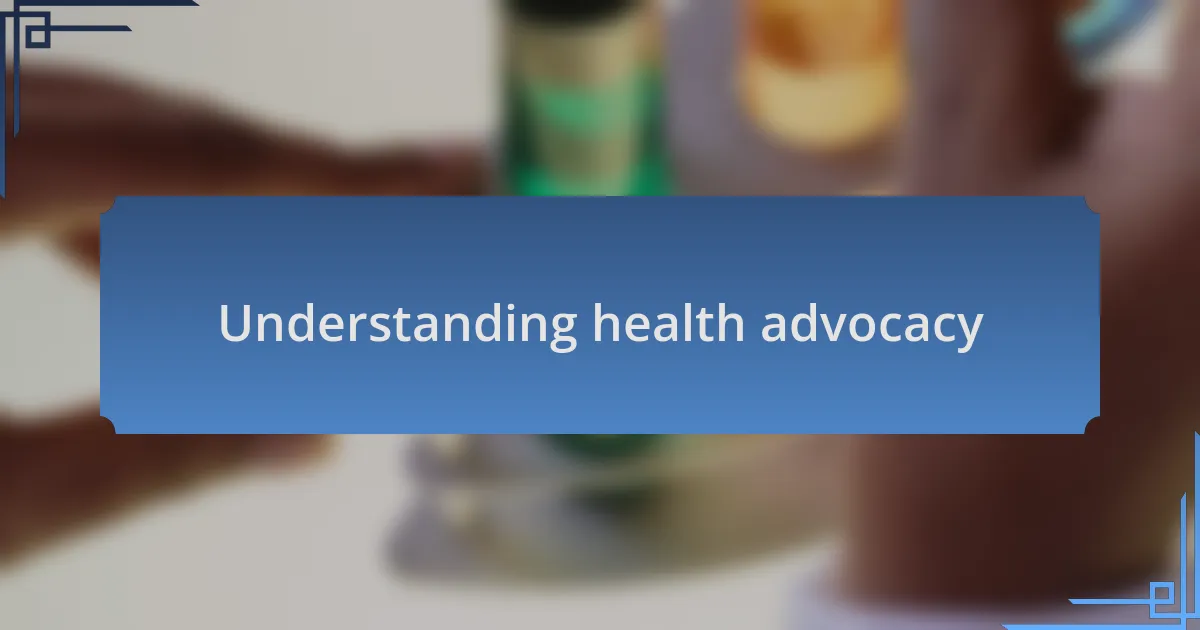
Understanding health advocacy
Health advocacy is about more than just speaking up for those in need; it’s about understanding the complexities within the healthcare system. I remember attending a health advocacy conference where I saw individuals from diverse backgrounds sharing their stories. It struck me how their experiences, rich with emotion and resilience, can create a powerful ripple effect in raising awareness and driving change.
As I reflect on my own experiences, I often wonder how we can better represent marginalized voices in these discussions. Each interaction I have with patients reminds me that advocacy starts with listening. When we take the time to truly hear someone, we are not just acknowledging their pain; we are forming the foundation for meaningful action and understanding.
Realizing that health advocacy can empower individuals to take control of their health journeys has changed my perspective significantly. I think about that time a friend sought help after years of feeling unheard; her courage to advocate for herself was inspiring. It made me realize that everyone has the potential to be an advocate, not just for themselves but for others, fostering a community of support and empowerment.
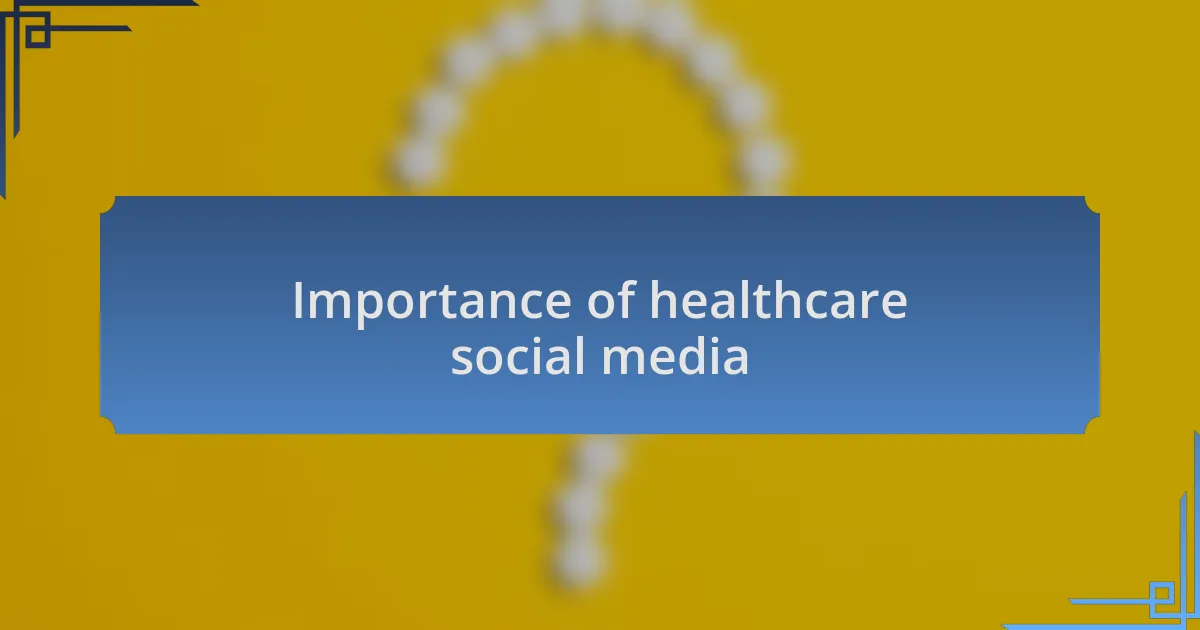
Importance of healthcare social media
The role of healthcare social media in health advocacy cannot be overstated. I still recall a moment when I stumbled upon a Twitter thread detailing someone’s journey through a chronic illness. The raw honesty in their posts not only educated me about their condition but also fostered a sense of community among others facing similar challenges. It made me realize how social media platforms have become vital tools for sharing knowledge and experiences, breaking down barriers to information access.
What truly captivates me about healthcare social media is its power to ignite conversations that may otherwise be silenced. I often find myself engaging in discussions on platforms where patients share their struggles, and it dawned on me how these interactions can create not just awareness but also empathy. Isn’t it fascinating that a simple tweet can lead to a newfound understanding of complex health issues, potentially changing how someone perceives their own health journey?
Moreover, social media serves as a bridge between health professionals and the public, fostering transparency in the healthcare system. I remember a time when a local doctor’s posts demystified medical jargon, making healthcare more approachable. This accessibility encourages informed decision-making and amplifies the voices of patients, showcasing the transformative potential of social media in advocating for better health outcomes and stronger community support.
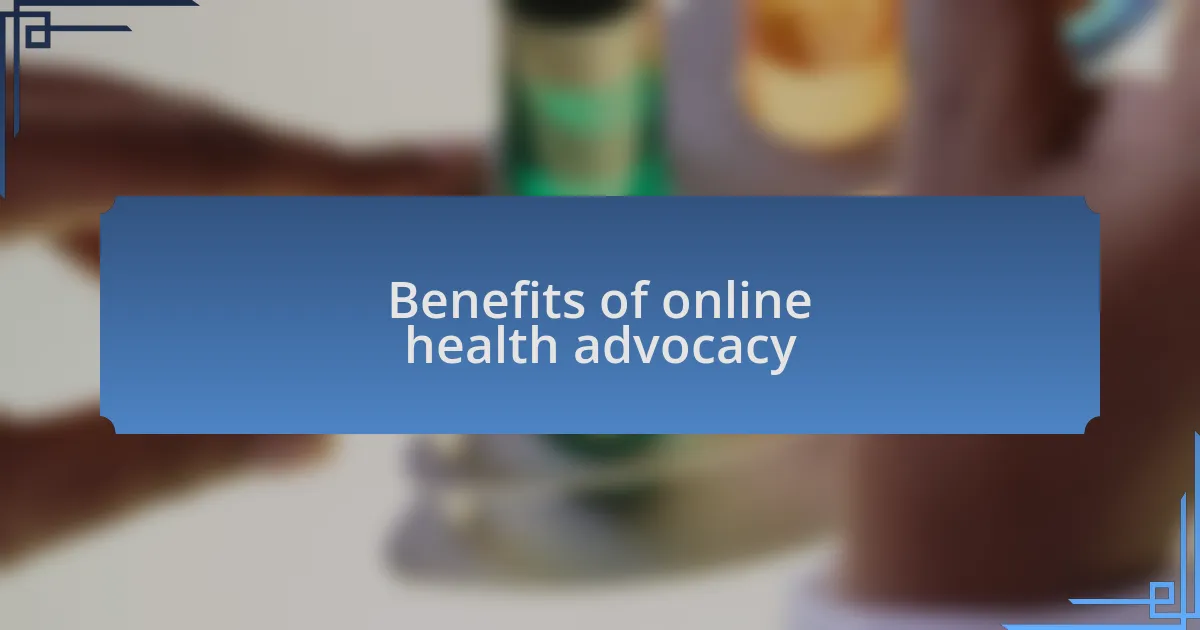
Benefits of online health advocacy
Online health advocacy offers an extraordinary platform for amplifying marginalized voices. I remember my own experience when I stumbled upon a group advocating for mental health awareness. The stories shared there were profound; they not only highlighted the struggles but also showcased incredible resilience. By creating a space for such narratives, we facilitate connection and empower individuals who might otherwise feel isolated. How powerful is it to realize that our shared experiences can uplift others?
Additionally, the immediacy of online platforms means that vital health information can spread rapidly, reaching those who need it most. I once came across a Facebook post detailing a new treatment breakthrough that wasn’t yet widely known. It struck me how a single share could potentially inform someone about an option that could change their life. This access to timely information can be crucial for patients navigating their healthcare choices and can lead to quicker advocacy for necessary changes in health policies.
Moreover, online advocacy cultivates collaborative efforts among advocates, healthcare providers, and organizations. During a campaign for better diabetes management resources, I saw how different voices came together, fueled by shared passion. It made me realize that by uniting on social media, we sharpen the focus on common goals and enact meaningful change in the healthcare landscape. Isn’t it inspiring to think that our digital interactions can catalyze real-world improvements in health advocacy?
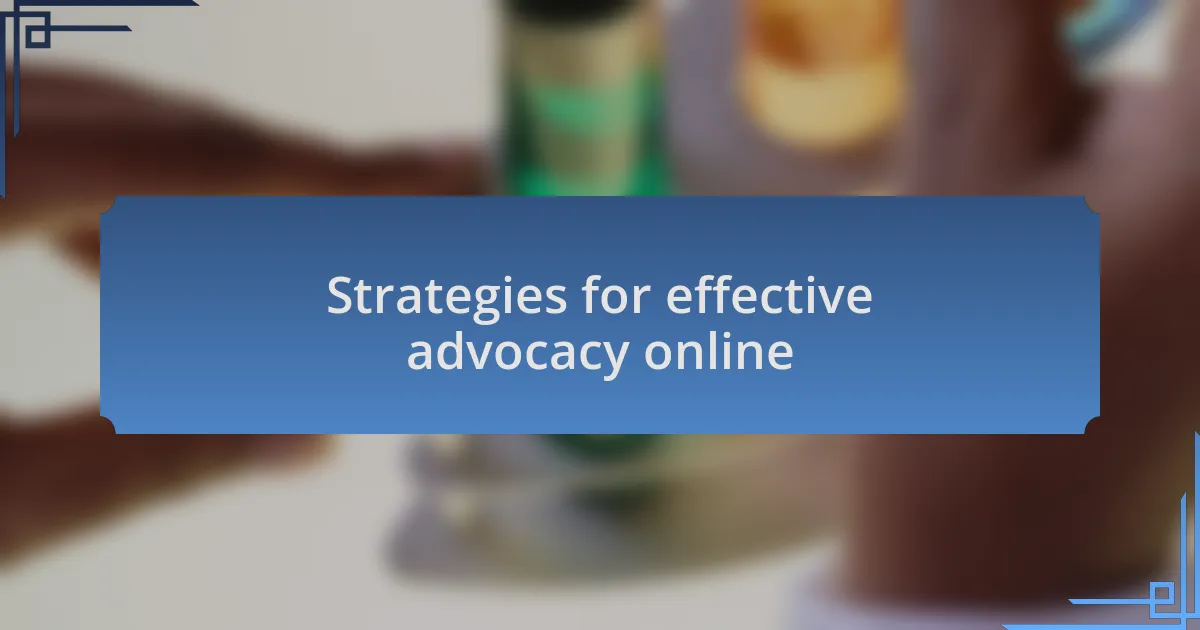
Strategies for effective advocacy online
When advocating online, storytelling proves to be a powerful tool. I recall participating in a Twitter thread where individuals shared their personal journeys with rare diseases. The vulnerability in those tweets connected us all, allowing us to draw attention to necessary treatments and policies. Isn’t it fascinating how sharing personal struggles can ignite collective action and awareness?
Engagement is another key strategy. I often find that when I post polls or open-ended questions about health topics, the responses can be overwhelming. During a campaign on mental health stigma, I invited people to share their thoughts, and the conversations that followed were eye-opening. This two-way dialogue not only informs advocacy but also fosters a community that feels heard and valued.
Finally, authenticity is critical in online advocacy. I remember when I shared a candid post about my own health challenges. The feedback I received was not just supportive; it motivated others to speak up about their experiences. Authenticity builds trust, and trust is the foundation upon which effective advocacy stands. How often do we connect with a message because it resonates with our own truths?
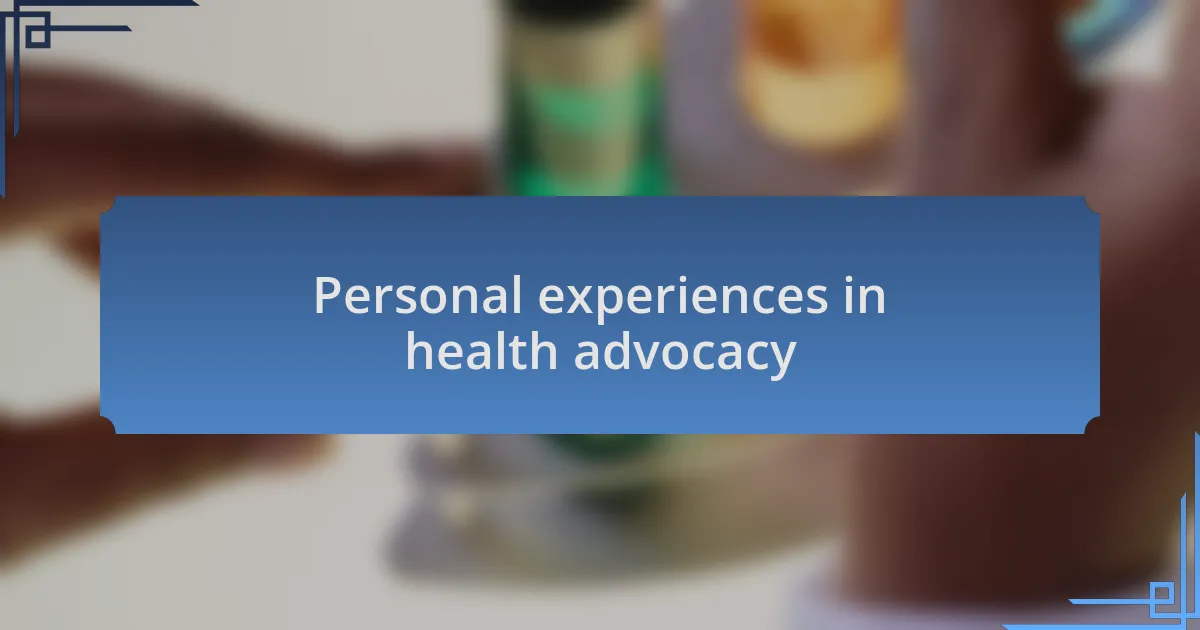
Personal experiences in health advocacy
In my journey of health advocacy, I’ve learned the importance of shared experiences. I remember a particular moment during a community event where I shared my struggles with diabetes. The honesty in my words seemed to resonate deeply with others, leading to a heartfelt conversation. It made me realize how vital it is to create spaces where people’s stories are heard; after all, isn’t that how we find common ground?
On another occasion, I took part in a panel discussion aimed at raising awareness about mental health in schools. Standing there, sharing not only facts but also my personal narrative about anxiety, I saw attendees nodding in understanding. I had this sense that my vulnerability was encouraging others to reflect on their own challenges. Isn’t it incredible how opening up can spark genuine dialogue and foster community healing?
Moreover, I’ll never forget when I organized an Instagram Live session to discuss the importance of access to healthcare. The overwhelming response showed how eager people are to talk about their health journeys. The question that lingered for me was, why do we often hesitate to express our needs? That experience reinforced my belief that advocacy is not just about raising issues but about empowering others to share their truths too.
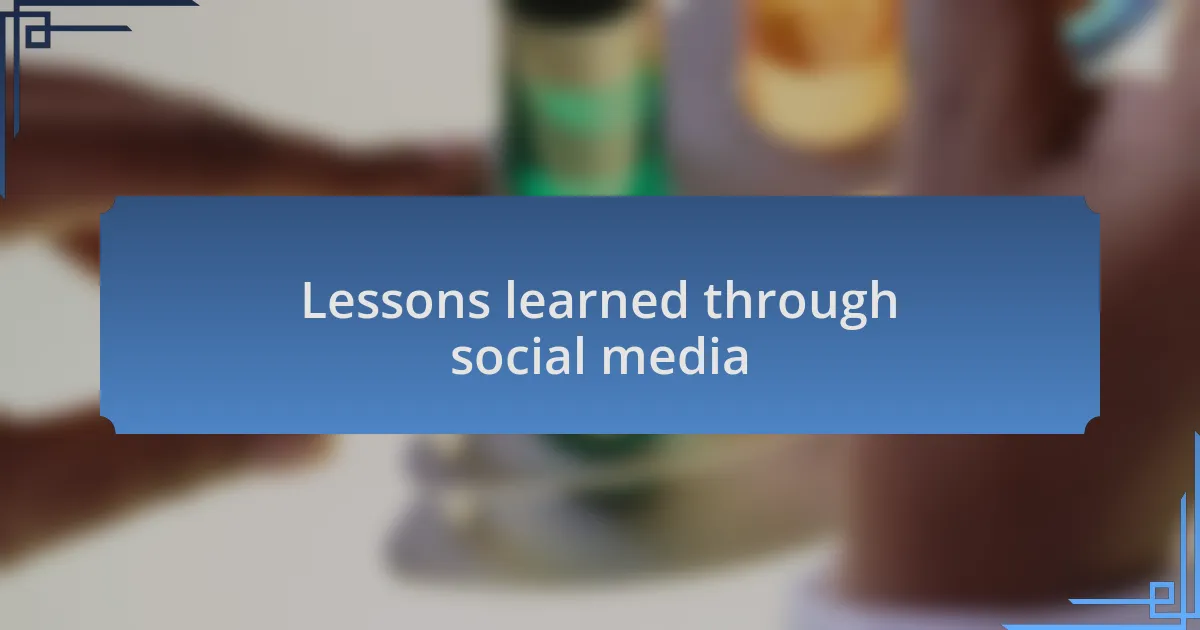
Lessons learned through social media
In reflecting on lessons learned through social media, I’ve come to appreciate the power of collective knowledge. One evening, I posted a simple question about managing chronic pain, and the flood of responses from people sharing their tips and experiences was both humbling and enlightening. It struck me—how often do we overlook the wisdom contained within our own communities?
I recall a time when my post advocating for mental health awareness went viral. The comments section turned into a support group, with individuals sharing their stories of struggle and resilience. This experience underscored for me that social media can serve as more than just a platform for sharing information; it can be a lifeline for those feeling isolated. How often do we underestimate social media’s ability to connect us on a deeper level?
Additionally, I’ve learned that transparency fosters trust. I once shared a candid video discussing my setbacks in health advocacy, and to my surprise, the engagement was tremendous. People responded not only with empathy but also by sharing their own challenges in health activism. Isn’t it fascinating how vulnerability can be a catalyst for greater connection and advocacy?